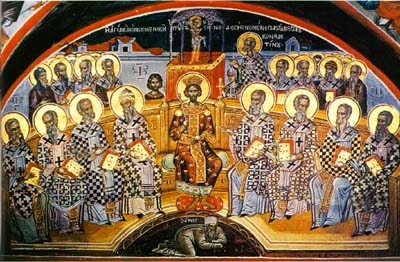Having looked, in the “theology chapter” of the forthcoming Getting Medieval with C S Lewis, first at our evangelical problem with Truth, then at the medieval scholastics’ way of understanding and teaching Truth, we now come to the central storyline of medieval theology: its unique attempt to hold faith and reason together.
I start my discussion of this heroic attempt with a brief account of where the early church thought heresy came from (surprisingly: an over-active use of reason) and how early theologians and councils acted to preserve the integrity of the apostolic faith.
The next post will show what medieval thinkers did with this early precedent when it came time to re-explain the mysteries of the faith for new socio-cultural realities.
When I say that medieval thinkers held reason and faith in a delicate balance, I am thinking of their ability to use reasoned understanding and argument not to erase mystery, but to carefully couch and protect it. This was a premodern trait. The modern tendency – let us say, post-Enlightenment – has been to put our trust in what Stanley Grenz called the “omnicompetence” of reason–its supposed ability to fix all humans problems and solve all conundrums. The postmodern tendency, on the other hand, is to point to the man behind the curtain, or the emperor who has no clothes–to assume that anybody who claims to have figured things out via reason is actually making a power grab, disguising baser motives.
I would argue that the postmoderns are now where the nominalists were at the end of the medieval period. They have looked cynically behind the claims that we may know truth, at least partially, via reason, and they have lost faith in our ability to see any truth beside the one each of us makes for ourselves. Conservatives today may even be tempted to identify postmoderns as those who, in the Dantean phrase, have “lost the good of the intellect”—they can no longer access moral truth. But that’s too easy: the fundamental insight of postmodernism is hard to argue with: people do in fact often claim to be following the direct dictates of reason when in fact their motives have little to do with reasoned understanding. (Nor is this even intentional much of the time!)[1]
But when we go back to a brilliant premodern Christian thinker such as the proto-scholastic Augustine of Hippo, we find a different process: Instead of claiming that “reason solves all,” he frequently looks up from an argument he’s just presented (say, on the nature of the Trinity), and he says: “I didn’t say you had to like it.” Continue reading


 Medieval Wisdom for Modern Christians
Medieval Wisdom for Modern Christians






